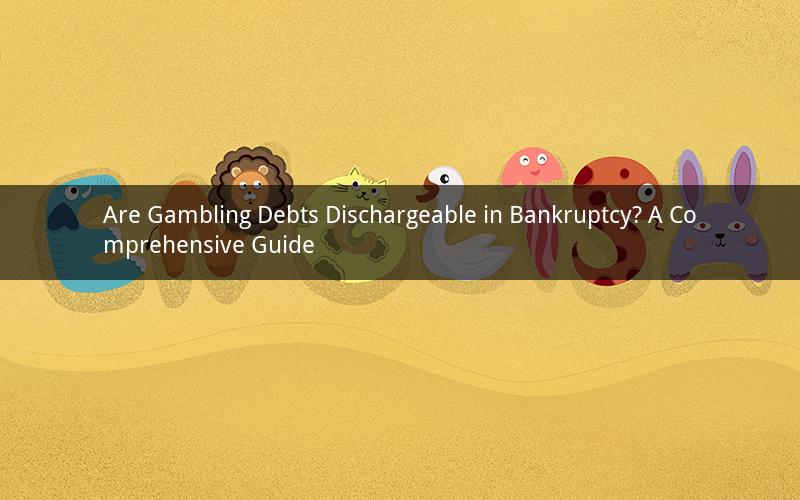
Introduction:
Gambling debts have become a significant concern for many individuals who find themselves in financial difficulties. One common question that arises is whether gambling debts are dischargeable in bankruptcy. This article aims to provide a comprehensive guide on this topic, exploring the legal aspects, potential exceptions, and the process involved.
1. Understanding Dischargeable Debts:
Dischargeable debts refer to those debts that can be eliminated through bankruptcy proceedings. These debts typically include credit card debts, medical bills, and personal loans. However, the dischargeability of gambling debts is a subject of debate and varies depending on the jurisdiction.
2. General Rule:
In most jurisdictions, gambling debts are considered dischargeable in bankruptcy. This means that if an individual files for bankruptcy, they can seek to have their gambling debts forgiven and no longer owe the debt. This is because bankruptcy laws are designed to provide individuals with a fresh start and relieve them from overwhelming debt burdens.
3. Exceptions to Dischargeability:
While gambling debts are generally dischargeable, there are certain exceptions where they may not be eligible for discharge. These exceptions include:
a. Debts Incurred Through Fraud: If an individual incurred gambling debts through fraudulent means, such as lying about their income or assets, the debt may not be dischargeable. This is because bankruptcy laws are not intended to protect individuals who engaged in fraudulent activities.
b. Debts Incurred Through Willful and Malicious Conduct: In some cases, if an individual's gambling debts were incurred through willful and malicious conduct, such as using gambling as a means to harm others, the debt may not be dischargeable.
c. Debts Incurred Through Certain Types of Bankruptcies: Some bankruptcy cases may have specific provisions that make gambling debts non-dischargeable. For example, in certain jurisdictions, debts incurred within a specific timeframe before filing for bankruptcy may not be dischargeable.
4. The Bankruptcy Process:
If an individual decides to file for bankruptcy to discharge their gambling debts, they must follow a specific process. Here is a general overview:
a. Consult with a Bankruptcy Attorney: It is highly recommended to consult with a bankruptcy attorney who can provide guidance throughout the process and ensure that all necessary steps are followed.
b. File a Bankruptcy Petition: The individual must file a bankruptcy petition with the appropriate bankruptcy court. The petition includes detailed information about their financial situation, including their income, expenses, assets, and debts.
c. Attend Credit Counseling: Before filing for bankruptcy, individuals are required to complete a credit counseling course. This course helps individuals understand their financial situation and explore alternatives to bankruptcy.
d. Attend a Meeting of Creditors: After filing for bankruptcy, the individual will attend a meeting of creditors, where creditors can ask questions about the individual's financial situation. However, in most cases, creditors do not attend these meetings.
e. Receive a Discharge: If the bankruptcy petition is approved, the individual will receive a discharge, which eliminates their eligible debts, including gambling debts.
5. Alternatives to Bankruptcy:
In some cases, individuals may want to explore alternatives to bankruptcy to address their gambling debts. Here are a few options:
a. Debt Consolidation: Debt consolidation involves combining multiple debts into a single loan with a lower interest rate. This can help individuals manage their debt more effectively and potentially reduce the overall amount owed.
b. Negotiating with Creditors: Individuals can negotiate with creditors to settle their debts for a lower amount or arrange a payment plan that is more manageable.
c. Credit Counseling: Credit counseling agencies can provide guidance and assistance in managing debt and developing a financial plan.
Conclusion:
Gambling debts can be dischargeable in bankruptcy, but there are exceptions depending on the circumstances. It is essential for individuals facing gambling debts to consult with a bankruptcy attorney to understand their options and the process involved. Exploring alternatives to bankruptcy, such as debt consolidation or negotiation with creditors, may also be beneficial in managing gambling debts.
Questions and Answers:
1. Q: Can I discharge gambling debts through bankruptcy?
A: Yes, in most jurisdictions, gambling debts are considered dischargeable in bankruptcy.
2. Q: What happens if I incurred gambling debts through fraudulent means?
A: If you incurred gambling debts through fraudulent means, the debt may not be dischargeable in bankruptcy.
3. Q: Can I negotiate with creditors to settle my gambling debts?
A: Yes, you can negotiate with creditors to settle your gambling debts for a lower amount or arrange a payment plan.
4. Q: Do I need to attend a meeting of creditors in bankruptcy?
A: Yes, you will attend a meeting of creditors, but in most cases, creditors do not attend these meetings.
5. Q: Can credit counseling help me manage my gambling debts?
A: Yes, credit counseling can provide guidance and assistance in managing debt and developing a financial plan.